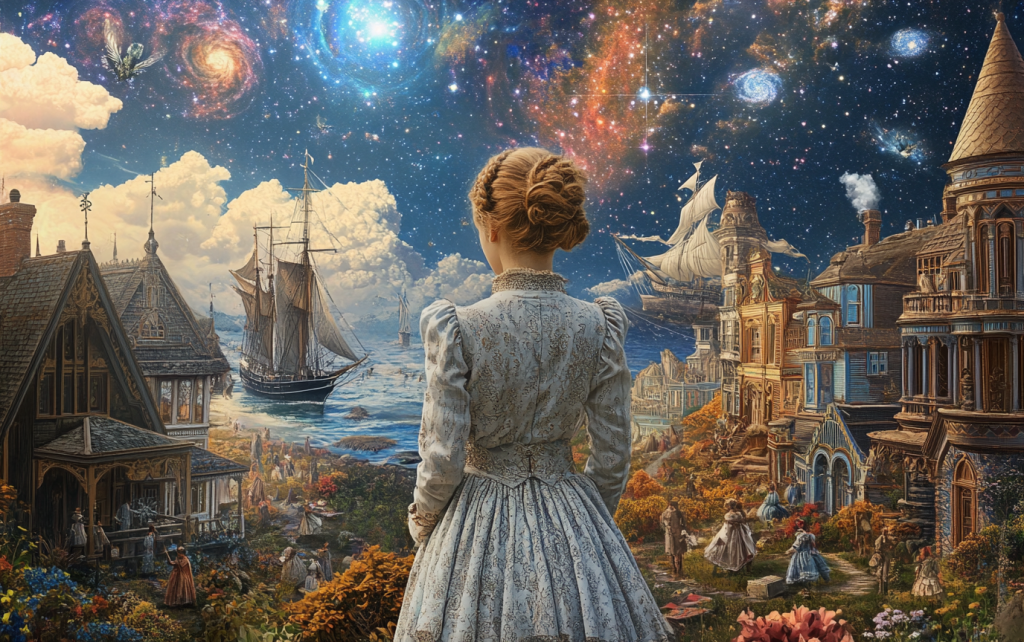Similarity in the celestium

Today’s thoughts on similarity (inspired by Christmas friction):
One of the diarists of the Salt Island Diaries, Clara, describes her visits to a heavenly dream-world. That heaven is part of a larger celestium where awarenesses of every conceivable type exist. In the vastness of possibility, very similar things huddle together. Awarenesses that are attracted to like awarenesses form poles of attraction. These are heavens.
Awarenesses that are annoyed by like awarenesses do not huddle together. They do not form heavens. However, they cannot escape each other: what it means to be in a reality is to share it with other awarenesses that are similar enough to perceive it the same way. For example, we agree that time passes the same way for everyone and clocks measure it the same way. Space has three dimensions. Physicists would (or should) argue with those last two statements, but the insight remains: it is the perception of reality that makes reality what it is. A different agreement is a different reality.
Realities are shared, or they are not realities — the latter are madnesses. And if realities are shared by beings who frustrate each other, they are hells.
Unfortunately, there are always more potential hells than heavens. This is due to the fact that there are more ways for things to be dissimilar than similar. Two paintings can be identical in exactly one way, and dissimilar in a nearly infinite number of ways. Two mechanical devices are more likely to have mismatched features; friction is more likely than harmony. This only increases as complexity increases. For example, two people with similar opinions, but very detailed opinions, are going to argue over the fine details.
Therefore, any consciousness complicated enough to think about similarity is going to perceive much more dissimilarity in the celestium than similarity. That is logically unavoidable. Most of that dissimilarity is going to be disharmonious because there are simply more ways for dissimilarity to be disharmonious.
There is so much hell, there is a temptation to consider Hell the default condition. Heavens seem to be idealistic fantasies, incongruent with possibility, when they are, logically, merely rare.
What the Diary dreams taught me is that waking reality is very much part of psychedelic reality. It obeys the principles of similarity: there are many hells and very few heavens — but both are possible. The only impossibility is to avoid working on one or the other.

> Awarenesses that are attracted to like awarenesses form poles of attraction (heavens).
An alternative theory: perhaps awarenesses can be too similar. Opposites attract, so they say; or, conversely, likes repel. I never understood the former, but I can recognize the latter. Too much similarity might be a barrier to success, whereas if you are slightly less similar — at least dissimilar Macken — it might be easier to work together?
> Opposites attract, so they say; or, conversely, likes repel.
That’s why your former lovers were all short, fat, stupid, and slovenly — religious fundamentalist, Tory, racist, misogynous… No, really, one has to do with similar people, but makes much of the residual differences.
You might be wondering why dominant people attract submissive people. It’s rather that they repel everyone else. Submissive people are otherwise fine with watching television and eating snacks. They don’t pine to be pushed around (BDSM is obviously a special case). When they do pledge fealty to a dominant person (usually to resist a less preferable domination), it’s not a pole of attraction. It’s some organization that operates by coercion. It is no heaven.
The folk wisdom of “opposites attract” is a fortune cookie that one receives in a hell. Why? Tidy people do not adore messy people. Tidiness is rather a point of friction. “Opposites attract” really means that people are so complex and multi-faceted, that one is unlikely to to find a match across all dimensions. Where there is a difference, there is something opposite, contrary, in opposition. And therein lies the difference between a heaven and a hell. In a heaven, non-functional differences are orthogonal, not oppositional.